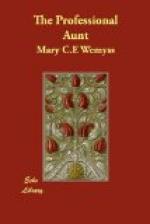I said I thought her behavior as regarded swing-doors was a surer one. She said she hadn’t thought of that.
“But I know what you mean; I do dislike the flouncing, pushing woman. I think every one should be taught to be courteous and gentle, don’t you?” She added, “I hate being pushed.”
I told her of a woman next me in a ’bus one day, who said, “You’re a-sittin’ on me!” How I rose and politely begged her pardon, whereupon she said, “Now you’re a-standin’ on me!” And we agreed that there is no pleasing some people.
Pauline returned to the perusal of the catalogue, in which she had put a large cross against the picture of a coat and skirt. She said she was stock-size. She didn’t suppose any really smart women were. “Or would own to it,” I suggested, but she didn’t answer; she never does if she detects any savor of malice in a remark. She was very anxious I should admire the illustration. I did, but I felt it my duty as a London cousin to a country cousin to tell her that the illustration might lead her to expect too much. She warmly agreed that of course as regarded the figure, etc., the illustration was misleading, because she, of course, could never look so beautifully willowy as that. She was inclined to come out where the illustration went in, and she could never be so slanty, never; but apart from that, of course the coat and skirt would be exactly as it was pictured. Her figure would be to blame, of course. Her figure happens to be a very pretty one, but she didn’t give me time to say so. I repeated that I should not put implicit faith in the illustration. She was a little hurt. She did not think it right to cast aspersions on the character of so respectable a firm as that whose name headed the catalogue. I said I didn’t see it quite in the same light. Pauline looked at me reproachfully, and said drawing a lie was as bad as telling one.
The argument was beyond me; besides, I like Pauline to look reproachfully at me, she is so pretty. Being as pretty as she undoubtedly is, I often wonder why she is not more effective.
The right kind of country beauty is very convincing to the jaded Londoner; but to convince, one must be convinced, and that is exactly what Pauline is not. She never thinks whether she is beautiful or not, and I am sure it often lies with the woman herself, how beautiful people think her, except in the rare cases of real beauty, when there can be but one opinion. But in the case of ordinary beauty, the woman is appraised at her own value. Then there is the art of putting on clothes, of which Pauline is absolutely ignorant. There is even a studied untidiness which passes under the name of picturesque. All of this is a closed book to Pauline, and, after all, she is a delightful creature; but the trouble to me was that, at the time she came up to shop with me, she didn’t wear good boots, and to do that I hold is part, or should be part, of a woman’s




